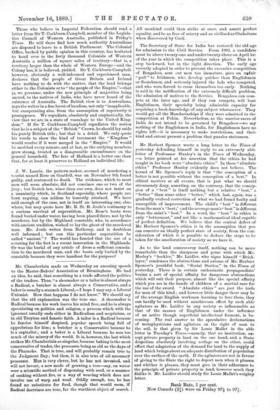Those who believe in Imperial Federation should read a letter
from Sir T. Cockburn-Campbell, member of the Legisla- tive Council of Western Australia, published in Friday's Times. He will there find how much authority Australians are disposed to leave to a British Parliament. The Colonial Office, backed by public opinion in this country, has hesitated to hand over to the forty thousand Colonists of Western Australia a million of square miles of territory—that is, a territory larger than the whole of Western Europe—and the Colony has, it is believed, yielded. Sir T. Cockburn-Campbell, however, obviously a well-informed and experienced man, declares that the people of Great Britain and Ireland have nothing to do with the matter, that the land belongs either to the Colonists or to "the people of the Empire,"—that is, we presume, under the new principle of majorities being sacred, to the natives of India, who have never heard of the existence of Australia. The British view is to Australians, says the writer in a fine burst of localism, not only "inapplicable, but exasperating also, from the assumption of superiority it presupposes. We repudiate, absolutely and emphatically, the view that we are in a state of vassalage to the United King- dom." If Sir T. Cockburn-Campbell repudiates the notion that he is a subject of the " British " Crown, he should lay aside his purely British title ; but that is a detail. We only quote his words to show the kind of treatment the " Kingdom " would receive if it were merged in the "Empire." It would be snubbed every minute, and at last, as the outlying members grew strong, treated as a disagreeable encumbrance on the general household. The fate of Holland is a better one than that, for at least it preserves to Holland an individual life.


















































 Previous page
Previous page